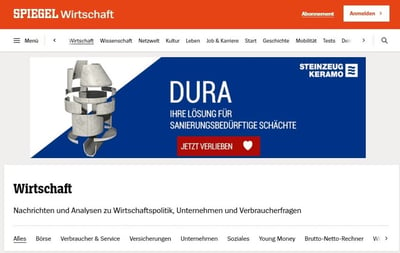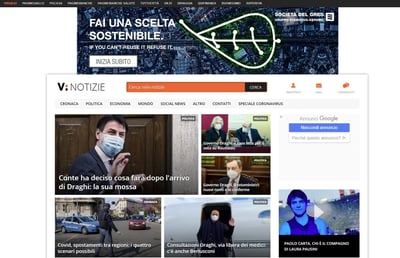Two countries, two goals, one approach: read in this success story how our customer Steinzeug-Keramo (now part of Pielife) used Account Based Marketing across countries for Germany and Italy.
But let's start at the beginning. In Germany, there are over 1 million manholes in need of rehabilitation. A suitable and durable rehabilitation solution for channels, berms and manhole walls is the DURA.PC System. As the solution is new in the portfolio of our customer Steinzeug-Keramo, a provider of modern water and wastewater management, its level of awareness was to be increased in the relevant market by means of ABM measures, and sales were to be supported: Certain key accounts such as engineering offices, municipal decision-makers or contractors for rehabilitation were advertised in a planned manner to arouse their interest in the solution. Once interest had been generated, the sales team was able to focus on convincing them of the benefits of the solution.
In the Italian market, the focus was different: the circular economy is a central pillar of the sustainability program of Steinzeug-Keramo and the parent company Wienerberger AG. It can reduce environmental impact, secure the supply of raw materials, increase competition and promote innovation. With this focus and the use of regional and natural resources, Steinzeug-Keramo supports the European Green Deal. The aim of the Italian ABM campaign was to make these Circular Economy achievements visible and to strengthen the brand in the perception of engineering offices, responsible officials and universities.
To achieve the set goals, we proceeded as follows.
Our Solution:
Step 1: Defining the target group - basis of every ABM campaign- Who should be targeted? For this purpose, our customer provided us with a list of key accounts for Germany and for Italy, agreed with the sales department, which included relevant and pre-selected contacts from the municipal sector, engineering firms, contractors and universities.
Step 2: Analyzing the target group, relating it to the goals and using the insights gained to create media banners for the relevant target group; in our example, display ads were created for the German market on the topic of DURA manhole renovation and for the Italian market on the topic of Circular Economy with "Make a Natural Choice".
 |
| Während in Deutschland die Bekanntheit der Sanierungslösung DURA.PC und das Produkt selbst im Vordergrund der Bannererstellung lag… |
 |
| … wurde in Italien das Thema Kreislaufwirtschaft mittels einer Luftaufnahme und Kanalnetzes in Blattoptik visualisiert. |
Step 3: Transfer all data - both the address lists and the created banners - into our B2B.IQ platform. Based on the existing data and with the help of IP and geo targeting, our platform was able to reach the persons from the accounts directly with the appropriate banners via different media. We achieved this, for example, through targeted display measures.
Step 4: The click of the prospect: For our customer, the interest was confirmed at this point, attention was generated, the lead was passed on, and the sales department was able to get on with its work. For the interested party, the click on the banner caused a forwarding to further information, once to the sustainability positioning and once to a product landing page of DURA.
Step 5: Maintaining and expanding contact with the customer. On the one hand, this is where sales comes into play: contact interested leads, educate them further about the product or additional solutions, deal with the customer's challenges and build a relationship. On the other hand, marketing can use these contacts for further action: Remind about the product, give additional information, stay in the prospect's mind.
Step 6: Analyzing the campaign and learnings for future activities.
The results:
- 87% of the Italian key accounts could be reached with the ABM campaign
- In Germany, the share was as high as 93.5%
- In Germany, the sales department was provided with a supportive measure, and potentially interested parties were approached directly by sales staff as soon as they had seen the campaign.
- In the Italian market, the sustainability topic was placed and established by means of ABM.
"B2B Media Group's Account Based Marketing approach both supported our sales activities in Germany and provided information about our Circular Economy services in Italy. Our content could be played out specifically to the different key accounts and decision-maker profiles could be reached across departments."
Our client:
Steinzeug-Keramo, (now part of Pipelife, is a solution and system provider for sustainable water and wastewater management. As a medium-sized company with many years of experience, it convinces with mature competence in all aspects of the production, installation and operation of water and wastewater systems. The company attaches great importance to the high quality and sustainability of its products. Its core competence lies in the production of future-oriented pipe systems that meet the highest technical, economic and ecological requirements. Its product range includes: Pipes, manholes, fittings, accessories and system solutions - for safe, reliable and economical use over generations.